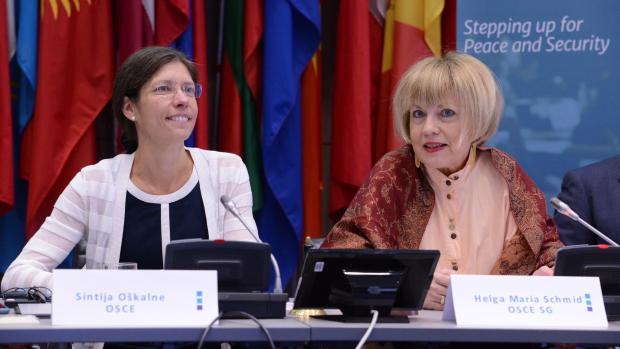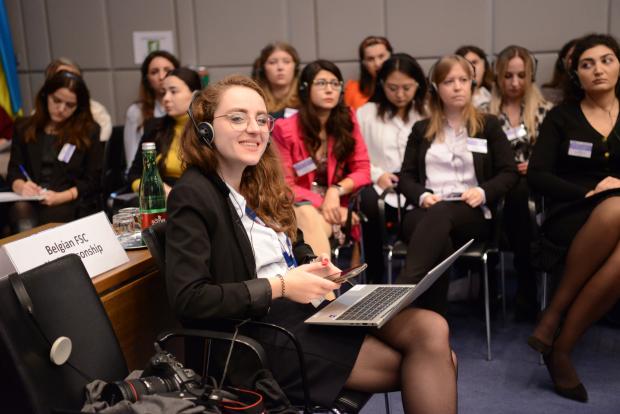Breaking Barriers: Empowering Young Women in Politico-Military Security through the OSCE Scholarship Programme
Peace needs women. But, despite international efforts to improve women's participation in peace and security processes, they continue to be overshadowed in these fields. While the representation of women at the decision-making level has increased over the past two decades according to United Nations Women, it is clear that too few take part in negotiations and discussions on arms control, disarmament and non-proliferation.
This is partially caused by societal perceptions rooted in tradition, but there are also strong ties to education. There is a gap in specific politico-military education offered free of charge to young professionals, especially women, which has been recognized by the OSCE.
“Universities have courses on international security, security policy and political science, but often no extensive training on arms control, disarmament, conflict prevention, and conflict management. This type of expertise is in great demand in international organizations such as the OSCE, so our idea was to fill this gap through capacity building," says Sintija Oškalne.
Sintija is a Confidence Security Building Measures Officer in the OSCE’s Conflict Prevention Centre, Forum for Security Co-operation (FSC) Support Unit. She is the Project Manager of the OSCE Scholarship for Peace and Security Training Programme, which focuses on supporting women’s meaningful engagement in the spheres of arms control and disarmament by bridging educational gaps.
The annual Programme, established seven years ago, helps young women and men develop the skills, expertise and confidence they need to take on roles as the next generation of decision-makers and negotiators.
“We admit around 90 percent women and 10 percent men, because we want to empower women to pursue their careers in the politico-military field," says Sintija.
One of the participants of the 2022 edition, Ms. Roqia Noori from Afghanistan, says the training programme has played an important part in her pursuit of a career in peace and security.
I see there is such an immense need for female engagement in approaching issues such as arms control and disarmament. This programme strengthened my belief that there is space for women to be the agents of change." - Roqia Noori
Increasing interest
The number of course applications has steadily increased since the programme’s launch in 2018; however, the 2023 edition of the OSCE Scholarship saw a record number of applicants.
The increase in participants reflects a real-world demand for young women to be actively involved in global peace and security processes, spurred on by the programme’s international recognition amongst alumni and professional circles. The programme also supports a growing online network of participants, which has drawn attention across the OSCE region.
The programme takes participants through nine weeks of online courses on the OSCE E-Learning Platform. Based on their applications and performance during this time, a group of successful female graduates is selected to travel to Vienna for a one-week, in-person training programme in autumn.
Having a large portion of the training as an interactive e-learning programme means being able to reach young people even in remote and isolated areas, and during the COVID-19 pandemic, this was a game changer, says Emma Drabarek, Assistant Project Officer of the Scholarship programme. “When COVID hit, the demand for online courses soared. While our in-person activities stalled, we had a well-developed and inquiry-based online programme ready. We added some live sessions and made the most of our in-house tools, which really made a difference."
Creating a special sense of community and support
The Programme has continued to evolve over the years. Today, there is a growing alumnae network for graduates to accompany them on their career paths, and new course offerings continue to be developed using the graduates’ feedback. This includes workshops on self-confidence, communication and leadership, which supplement the skills taught in the core course.
Ilina Dimovska from North Macedonia, who took the course in 2019, says the programme and workshops have made her more courageous.
I saw that there is space for women in security and that has made me work harder in school. I have become more aware of gender-related issues, and I feel more empowered to take a stand. I would like to encourage women in my country to participate in security discussions and training courses like this one, without feeling that there is no place for them." - Ilina Dimovska
The courses and workshops have received positive feedback from the participants, and many have shared how the alumnae network in particular has created a special sense of community and support.
“We recently participated in a follow-up meeting with some of the graduates, and it was amazing to see how closely they keep in touch and support each other. They cheer each other on, which is so important in such a male-dominated field. Our main goal is to empower, educate and inspire young people to step up towards their meaningful participation in the security sector, but to have this added benefit of community is the cherry on top," says Emma Drabarek.
Joana Lopes from Portugal, who graduated from the course in 2023, said that the Scholarship had equipped her with the skills to further develop her professional goals.
After finishing my online learning journey, I am eager and motivated to take the next step and pursue a career in this area, especially relating to addressing transnational threats and new weapon technologies for peacebuilding purposes.” - Joana Lopes
Follow updates about the 2023 OSCE Scholarship for Peace and Security and find out about the application process for next year here.



